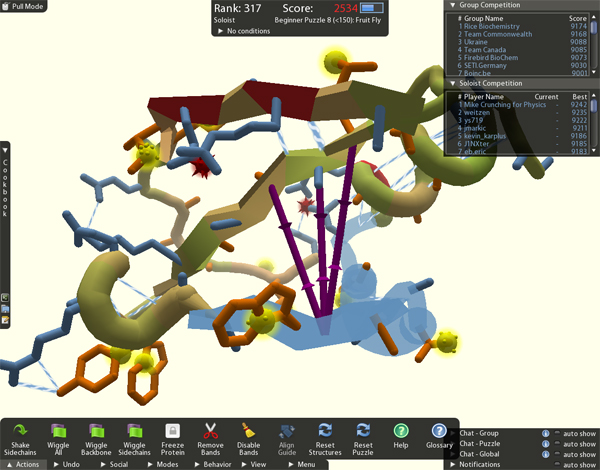Science News
Citizen/Gamer Scientists

“Our ultimate goal is to have ordinary people play the game and eventually be candidates for winning the Nobel Prize,” said Zoran Popovic, a computer scientist and engineer at the University of Washington.
That’s from a New York Times article that ran over two years ago. At the time, the University of Washington was launching an online game called FoldIt, where computer gamers, mostly non-scientists, would unravel the mysteries of protein folding.
The “ordinary people” (more than 57,000!) haven’t won the Nobel Prize yet, but this week they did get published in a prestigious scientific journal—Nature—for their work over the past two years.
According to the New York Times this week:
Proteins are essentially biological nano-machines that carry out myriad functions in the body, and biologists have long sought to understand how the long chains of amino acids that make up each protein fold into their specific configurations.
And Wired says that:
Determining how amino acid chains fold dense proteins is a basic challenge for molecular biologists, who link misfolding to diseases like Alzheimer’s and cystic fibrosis.
The University of Washington originally developed a program called Rosetta to try and do the “unfolding”, or untangling of the hundreds of amino acids. Rosetta was conceived to work like SETI@home, making use of the CPU of an idle computer.
Then the people who downloaded it wanted more. From Ed Yong’s blog in Discover:
But the volunteers wanted to use their biological computers—their brains—as well as their man-made ones.
FoldIt was launched and was quickly discovered to be successful. Again from Wired:
The researchers presented the Foldit community with 10 never-before-described proteins, which were also fed into Rosetta. The players’ answers were consistently more accurate.
The human brain’s intuition and creative-thinking skills were credited with being able to judge the protein puzzles better than a computer. In addition, players can collaborate and an entire social network has been established with forums and a wiki that also provides feedback to the game creators.
Science News reports that:
Foldit was such a success that the University of Washington is starting a new center for game science, [lead author Seth] Cooper says. Perhaps many scientific problems — especially spatial ones — can be tackled en masse online.
Perhaps those gamers will win a Nobel yet.